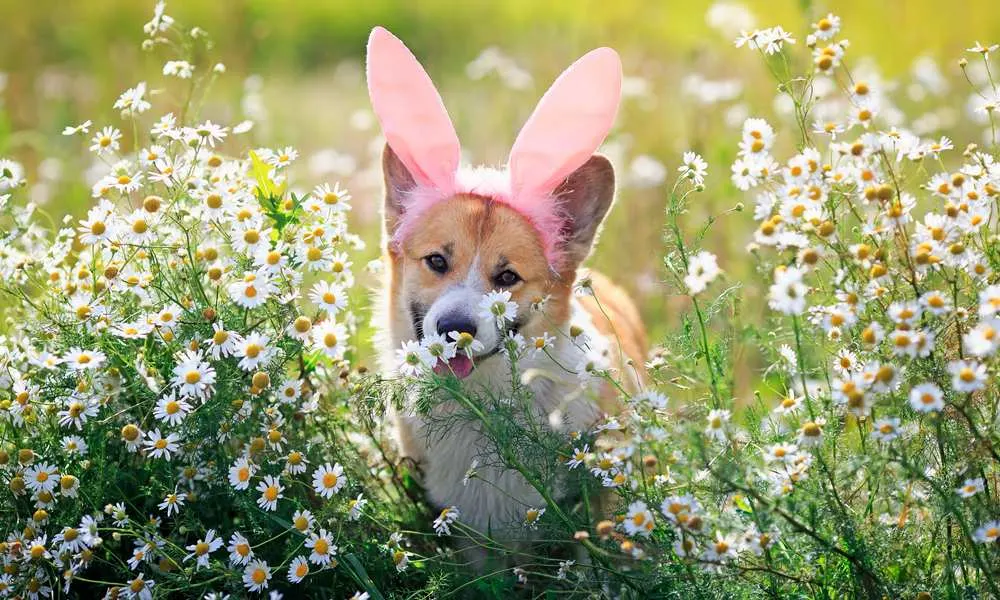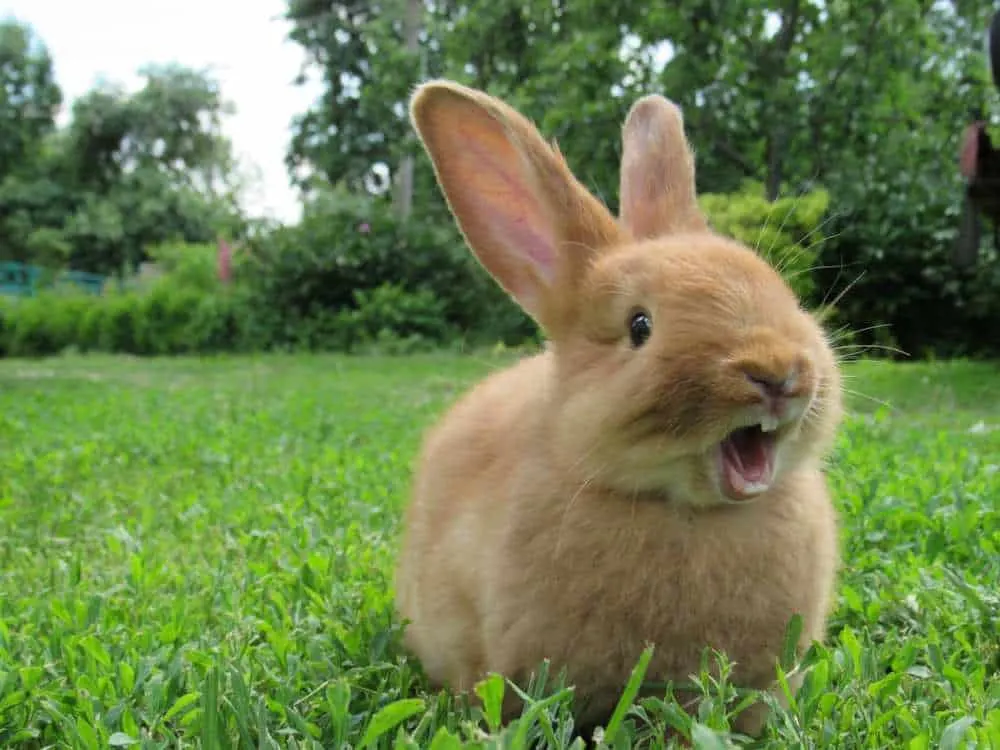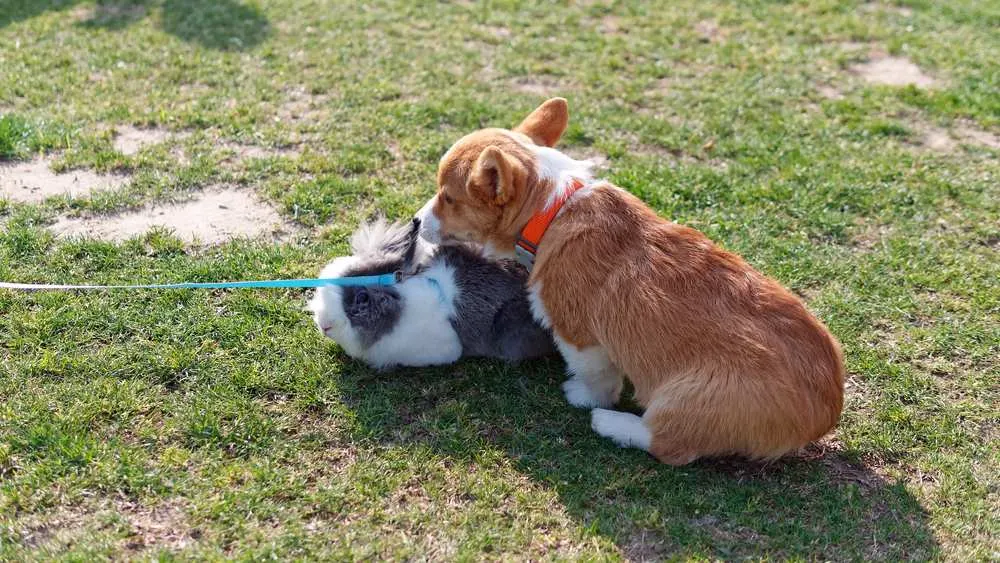With so few options regarding the potential friends for corgis, some owners try to find the solution in pairing them with other animals. Some try it with exotic birds, others with guinea pigs.
They may be some of the favorite choices for plenty of corgi enthusiasts, but one sits on the top of the bucket list. The most common question regarding the topic at hand is: “Do corgis and rabbits get along?”, is that even possible?
I’m sorry to inform you that pairing corgis with rabbits is not doable for numerous reasons.
Why can’t you mix them? Many animal magazines write about just how similar bunnies are to corgis. So what stops them from being best friends? What are the consequences of pairing them together?
I’ve gone the extra mile to provide answers to these questions for you. Additionally, some individual facts about both corgis and bunnies are also there – just you wait!
Many people still believe that they can work things out between corgis and rabbits because they have so many similar traits. Stick around to find out why that is just not possible.

Introducing Corgis
I bet that you just can’t imagine taking your beloved dog to the park and not seeing a single corgi around. Be it the Pembroke Welsh Corgi or Cardigan Welsh Corgi; these days, they can be found everywhere.
In 1925, both breeds appeared together under the rules of The Kennel Club in Britain. They were fully recognized by the club in 1928 and were initially categorized together under the single heading of Welsh Corgis. Later, in 1934, the breeds were identified as separate and distinct.
Earlier, corgis were used as herding dogs. With their keen predatory instincts, they were capable of hunting other animals. As time passed, corgis were gradually converted into house dogs with a few instances of serving as pastoral dogs.
Don’t let corgis’ small bodies fool you; they are still potentially dangerous dogs. When you see them on the streets, you probably think it’s all fun and games with them. Even though corgis are mainly used as pets, they will attack anyone they recognize as a potential threat.
Corgis are incredibly protective. The first time it sees you, whether as a pup or adult, if you feed it and take care of them, they will love you until their last day. Make no mistake – with both humans and other dogs, if corgis consider someone a part of the family, they’ll protect it all time.
Whenever people, who own a dog and plan to have children, most of them have doubts about how that will work out. Fortunately, corgi owners never have those problems as both breeds are phenomenal with little kids. Pairing them together was and will always be safe!
Head to your local store and buy a long leash. Corgis are energetic and require lots of exercise daily. Even if you live in a house with a large backyard, corgis will always be delighted if you present them with their favorite leash!
Contrary to some beliefs – corgis enjoy and are capable of going for long walks. As long as you maintain a moderate pace, they can walk anywhere from 6 to 8 miles. Just remember to always bring some water with you as corgis become thirsty relatively quickly.
Make sure that the walls of your property are adequately high. Corgis aren’t particularly fond of escaping their living space. In my fifteen years of having them, not a single instance of running away has occurred.
High walls are meant to lower the chances of trespassing! You don’t want to find yourself on the wrong side of the wall. Any unwanted guests are a target for corgis, and they will not hesitate to attack them on sight. Corgis are good-tempered but value their territory more than anything.

Introducing Rabbits
Plan on making a picnic in the wild? When you arrive on the plain fields or a forest, you can expect to see a couple of rabbits around the place. Wild bunnies live in loads of different areas, like meadows, woods, forests, grasslands, deserts, and wetlands.
Rabbits need to adapt to various circumstances to survive. Every environment has its ups and downs. Most bunnies found in the wilderness are gray-colored as that color is best suited for survival. In snow-prone areas, you can see rabbits that have a bright white color.
All bunnies are herbivores that feed by grazing on leafy weeds and grass. Wild rabbits live in groups; to reach the safety maximum, they stick together. Having those extra-long ears can give them a couple of extra seconds to escape from a potentially dire situation.
You see, bunnies are prey to numerous animals like hawks, wolves, bears, and even snakes! If confronted by a potential threat, a rabbit may freeze and observe, then warn others in the warren with powerful thumps on the ground. Warrens are tunnels that bunnies dig underground.
Even in the Middle Ages, the rabbits from Europe have been widely kept as livestock, starting in ancient Rome. Since the early 19th century, bunnies have been gradually domesticated and kept as pets. Today, it isn’t surprising to hear that even your neighbors have some rabbits as pets!
If you plan on taking some rabbits and bring them home with you, you should know the following stuff:
- You should have a spacious environment at your disposal if you plan on adopting some bunnies. A flat is fine for some minor types of rabbits, but even they would prefer to have an open field that has loads of space with green grass.
- Bunnies are energetic creatures. They love to run and jump all around the place. To have the energy to maintain their habits, rabbits need to eat correctly. Their diet should consist of good quality hay and grass, fresh veggies, and some fruits.
- In need of constant attention, you’ll have to spare some of your free time to entertain your rabbits.
In contrast to wild rabbits, domesticated ones don’t live in constant fear of being chased and eaten alive. This is where we stumble upon the peak of the topic.

What Makes It So Difficult To Pair Corgis And Rabbits Together?
Most of the time, social animals will always enjoy the company of their own kind, given a choice.
Many people often ask are corgis good with rabbits. It is necessary to address that as their relationship may cause some severe problems.
Take a step back and try to remember what I have written earlier – not ringing the bell? Most dogs, particularly corgis, have strong predatory instincts that drive them towards potential prey. On the other hand, rabbits are prey to many different animals. See what I’m getting at?
Are Corgis Good With Rabbits?
| Pairing corgis and rabbits together are like adding oil to the fire. There would be a constant threat of corgis potentially attacking bunnies. |
There are several reasons why that happens:
- Corgis can tolerate some other types of dogs, but even that is hard for them to learn! With their bossy characteristics, they are easily irritated just by the presence of other dogs sometimes. They won’t hesitate to attack larger breeds; imagine what corgis would do to little bunnies!
- Corgis and rabbits both require lots of free space. They both like to play and goof around at any given opportunity. Unfortunately, corgis are incredibly territorial, leading them to think that bunnies are a potential threat. It makes me sad that they can’t play together!
- You just can’t leave other animals alone with corgis. With every passing minute, the risk of corgis attacking them rises. Pets like birds, gerbils, guinea pigs, and especially rabbits can aggravate corgis quickly.
- Trying to balance out giving attention to someone else besides your corgis can make them dissatisfied. Rabbits and corgis both demand high levels of engagement from their owners. Devoting any free time to bunnies will cause jealousy inside corgis.
- Corgis would try to chase around rabbits as they look upon small animals as toys for their entertainment. Between kids, a game of catch is fun, but for bunnies, being on the constant run and fear for their lives can lead to some psychological traumas.
Don’t let me get even started on what happens if corgis charge with full rage towards rabbits. Imagine going to work for eight hours and thinking all the time how you will cook a nice meal when you get home.
That thought is instantly ruined as you stumble upon as your corgis have choked out a poor bunny. You never know what your dog might think and do in a few hours when you leave it alone. To be on the safe side, never consider pairing corgis and rabbits together!

Do Corgis And Rabbits Get Along? – Final Thoughts
For owners who want to find the perfect friend for corgis out there, I have a message:
Not all relationships are meant to be successful, and this one is a prime example of one of those. Corgis just can’t tolerate rabbits in any way, and it’s evident as to why.
Even though they share some similarities (like being energetic), you can’t categorize them as the same animal type. Corgis are hunting dogs that have a strong urge to chase any prey that they find fit. Of course, bunnies are just that and don’t enjoy playing catch with them.
Rabbits can develop particular psychological traumas that will inevitably affect their overall well-being. They need to live in a safe environment that has as low potential threats as possible. Sharing territory with corgis just won’t work as their presence will alarm them at all times.
Help your rabbits out by not mixing them with corgis, as the risk of them hurting bunnies is just too high. Browse our website; there are lots of healthier options for a potential friend for corgis!

